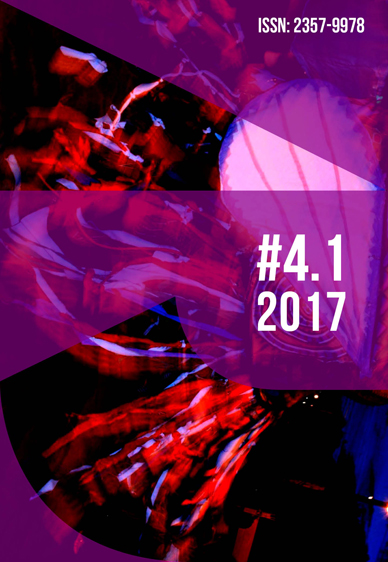Visões cinematográficas da ópera nos trópicos
DOI:
https://doi.org/10.36025/arj.v4i1.11087Palavras-chave:
Ópera, Música, Cinema, Marcel Camus, Werner HerzogResumo
Na visão europeia sobre o Brasil às Américas, há uma constante oposição entre natureza, muitas vezes vista como hostil, e civilização. A partir da chegada da corte portuguesa no Rio de Janeiro, há duas tendências gerais na visão sobre as transformações no país: ou a necessidade de se “forçar” a civilização na nova sede do império luso, através de diversos projetos, ou a de uma busca de “aclimatação” da cultura europeia. Processos complementares, que às vezes se apresentam como opostos. A proposta do presente artigo é discutir, através dos filmes Orphée Noir de Marcel Camus e Fitzcarraldo de Werner Herzog, como visões consolidadas sobre transferências culturais em geral, e sobre a ópera em particular, operam na maneira como estudamos as artes no Brasil.
Downloads
Referências
BARATA, Mário. “Manuscrito inédito de Lebreton. Sobre o estabelecimento de dupla escola de artes no Rio de Janeiro, em 1816”. Revista do SPHAN, Rio de Janeiro, n. 14, 1959, p. 283-307.
CAMPOS-MUÑOZ, G. Contrapuntos Órficos: Mitografía brasileña y el mito de Orfeo. Latin American Research Review, Vol. 47, Special Issue, 2012, p. 31-48.
CITRON, Marcia J. Opera on Screen. Yale: Yale University Press, 2000.
CITRON, Marcia J. When Opera meets Film. Cambridge: Cambridge University Press, 2010.
CRONIN, P. (Ed.). Werner Herzog. A Guide for the Perplexed. Londres: Faber & Faber, 2014.
DENIS, Ferdinand. Résumé de l’histoire littéraire du Portugal et du Brésil. Paris: Lecointe et Durey, 1816.
DIES, A. C. Biographische Nachrichten von Joseph Haydn. Viena: Camesina, 1810.
FERREIRA, Procópio. O ator Vasques. 2a. ed. Rio de Janeiro: MEC-SEAC-FUNARTE-Serviço Nacional do Teatro, 1979.
FLÉCHET, Anaïs. Offenbach no Rio. A febre da opereta no Brasil do Segundo Reinado. In: ABREU, M.; DAECTO, M. M. (Ed.). A circulação transatlântica dos impressos: conexões. Campinas: IEL-Setor de Publicações, 2014, p. 311-324.
FLÉCHET, Anaïs. Um mito exótico? A recepção crítica de Orfeu Negro de Marcel Camus (1959-2008). Significação, n. 32, 2009, p. 43-62.
GRASSE, J. Conflation and Conflict in Brazilian Popular Music: Forty Years between 'Filming' Bossa Nova in Orfeu Negro and Rap in Orfeu. Popular Music, Vol. 23, No. 3 (Oct., 2004), p. 291-310.
GROVER-FRIEDLANDER, Michal., Vocal Apparitions: The Attraction of Cinema to Opera. Princeton, Oxford: Princeton University Press, 2005.
HERZOG, Werner. Conquest of the Useless: Reflections from the making of Fitzcarraldo. New York: Ecco, 2010.
JOE, Jeongwong; THERESA, Rose (Ed.). Between Opera and Cinema. Nova York, Londres: Routledge, 2002.
KOEPNICK, L. P., Colonial Forestry: Sylvan Politics in Werner Herzog's Aguirre and Fitzcarraldo. New German Critique, No. 60, Special Issue on German Film History (Autumn, 1993), p. 133-159.
LEITHOLD, Theodor von; RANGO, Ludwig von. Rio de janeiro visto por dois prussianos em 1819. Trad.: J. de S. Leão Filho. São Paulo: Nacional, 1966.
LEPPERT, Richard. Opera, Aesthetic Violence, and the Imposition of Modernity: Fitzcarraldo. In: GOLDMARK, D.; KRAMER, L.; LEPPERT, R. (Ed.). Beyond the Soundtrack: Representing Music in Cinema. Univ. of California Press, 2007, p. 99-119.
LEVIN, O. M. Offenbach e a disputa pelo público brasileiro. In: ABREU, M.; DAECTO, M. M. (Ed.). A circulação transatlântica dos impressos: conexões. Campinas: IEL-Setor de Publicações, 2014, p. 299-310.
MELBYE, D. The Contemplative Landscape. Allegories of Space in Cinema. 216 p. PhD Diss., Univ. of Southern California, 2006.
MORAES, Vinicius de. Poesia completa e Prosa. Rio de Janeiro: Nova Aguilar, 1986.
PERRONE, Charles A. Myth, Mythopeia, and Mimesis: Black Orpheus, Orfeu, and Internationalization in Brazilian Popular Music. In: PERRONE, C.; DUNN, Christopher (Ed.). Brazilian Popular Music and Globalization. Nova York, Londres: Routledge, 2002, p. 46-75.
PRAGER, Brad (Ed.). A Companion to Werner Herzog. Hoboken, NJ: Wiley-Blackwell, 2012.
PRICE, Sally. Primitive Art in Civilized Places. 2a ed. Chicago: Univ. of Chicago Press, 2002.
RANGO, Ludwig von. Tagebuch meiner Reise nach Rio de Janeiro in Brasilien, und zurück: In den Jahren 1819 und 1820. 2a ed. Ronneburg: Friedrich Weber, 1832.
ROGERS, Holly. Fitzcarraldo's Search for Aguirre: Music and Text in the Amazonian Films of Werner Herzog. Journal of the Royal Musical Association, Vol. 129, No. 1 (2004), p. 77-99.
SARTRE, Jean-Paul. Orphée noir. In: SENGHOR, L. S. (Ed.). Anthologie de la nouvelle poésie nègre et malgache de la langue française. Paris: PUF, 1948, p. IX-XLIV.
SOUZA, Silvia C. M. de. Um Offenbach tropical. Francisco Correa Vasques e o teatro musicado no Rio de Janeiro da segunda metade do século XIX. Anais do XVIII Encontro Regional de História – O historiador e seu tempo, ANPUH/SP – UNESP/Assis, 24 a 28 de julho de 2006, CD-rom.
STAM, Robert. Tropical Multiculturalism: A Comparative History of Race in Brazilian Cinema and Culture. Durham: Duke University Press, 1997.
YON, J.-C. A ópera-bufa de Offenbach: algumas pistas para o estudo da circulação mundial de um repertório no século XIX”. In: ABREU, M.; DAECTO, M. M. (Ed.). A circulação transatlântica dos impressos: conexões. Campinas: IEL-Setor de Publicações, 2014, p. 283-290.
Filmes:
BURDEN of dreams. Direção: Les Blank. 1982.
FITZCARRALDO. Direção:Werner Herzog. Versatil Home Video. 1982.
ORFEU do Carnaval. Direção: Marcel Camus. Continental Home Video. 1959
Downloads
Publicado
Como Citar
Edição
Seção
Licença
Copyright (c) 2017 Paulo Kühl (Autor)

Este trabalho está licenciado sob uma licença Creative Commons Attribution-NonCommercial-ShareAlike 4.0 International License.

Esta obra está licenciada com uma Licença Creative Commons Atribuição-NãoComercial-CompartilhaIgual 4.0 Internacional.
Autores detêm os direitos autorais ao licenciar sua produção sob Creative Commons Atribuição-NãoComercial-CompartilhaIgual 4.0 Internacional.


 English
English Português (Brasil)
Português (Brasil)
